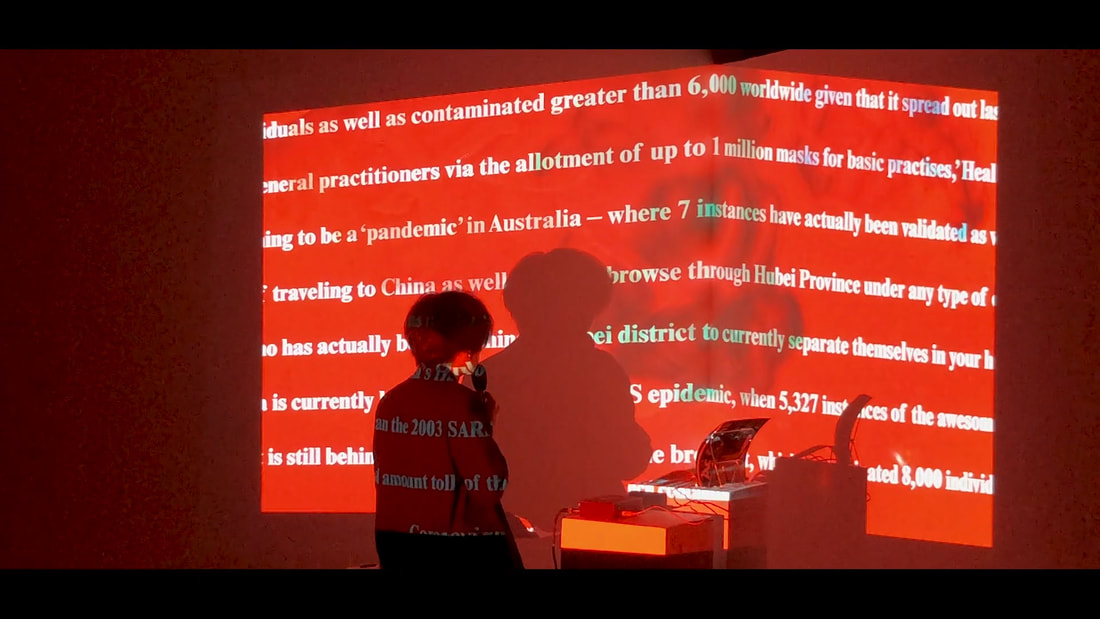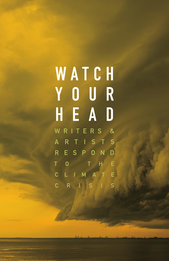|
1/31/2021 PERFORMANCE: JAMES LEGASPIchange Medium: performance documentation Duration: 10m19s April 2020 change is a 10-minute performance comprised of a single-channel video projected over a lone singer. The singer’s voice first delivers a rendition of Sam Cooke’s A Change Is Gonna Come through a vocoder, then moves into spoken poetry. By manipulating archived, found footage and combining it with its interactions between the body and voice, this performance confronts decolonization through an Asian-Canadian lens, notably putting the singer/speaker/artist directly into the environment being challenged. Created and performed at the wake of the pandemic, change’s main function is to respond directly to the xenophobia, Sinophobia, and unabashed racism that the current COVID-19 pandemic and biased mainstream media encourage. James Legaspi is an emerging Filipino-Canadian multimedia artist currently completing an undergraduate degree at the University of Toronto and Sheridan College, living and working in Brampton, Ontario. Recent activity includes work exhibited at the Art Museum at the University of Toronto and Gallery 44, curatorial work at the Blackwood Gallery, professional experience as a teaching assistant at Sheridan College, and participation in the most recent rendition of Visual Arts Mississauga’s Creative Residency.
If you missed our Word on the Street Toronto event, you can watch it here. In Watch Your Head, poems, stories, essays, and artwork sound the alarm on the present and future consequences of the climate emergency. Ice caps are melting, wildfires are raging, and species extinction is accelerating. Dire predictions about the climate emergency from scientists, Indigenous land and water defenders, and striking school children have mostly been ignored by the very institutions – government, education, industry, and media – with the power to do something about it. Join us for a conversation with editor Kathryn Mockler and anthology contributors Carleigh Baker, Simone Dalton, Christine Leclerc, and Carrianne Leung on their calls to action for the climate crisis facing us all. The City Imagines series is presented by The Word On The Street, a national celebration of storytelling, ideas, and imagination. About the Panelists
Carleigh Baker is a Cree-Métis/Icelandic writer. She was born and raised on the traditional, ancestral, unceded territory of the Stó:lō people. Her first collection of stories, Bad Endings, won the City of Vancouver Book Award. Simone Dalton is a Trinidadian-Canadian writer, arts educator, and recipient of the 2020 RBC Taylor Emerging Writer Prize for nonfiction. Her work is anthologized in Watch Your Head, Black Writers Matter, and The Unpublished City: Volume I. Her play VOWS was produced in 2019. As a memoirist, she explores themes of grief, inherited histories, race, class, and identity. Christine Leclerc lives, works and studies in Coast Salish Homelands / Burnaby, B.C. She is an award-winning author and Physical Geography major at Simon Fraser University. Leclerc serves on the non-profit boards of Embark Sustainability and Climatch. She has also served on the board of Sierra Club BC. Carrianne Leung is a Canadian writer, who won the Danuta Gleed Literary Award in 2019 for her short story collection That Time I Loved You. Originally from Hong Kong, Leung moved to Canada in childhood, and grew up in the Scarborough district of Toronto, Ontario. Moderator Kathryn Mockler edited the print anthology Watch Your Head: Writers and Artists Respond to the Climate Crisis (Coach House Books, 2020) and is the publisher of the Watch Your Head website. Her debut collection of stories is forthcoming from Book*hug in 2023, and she is an Assistant Professor of Screenwriting at the University of Victoria. 1/10/2021 POETRY: KIRSTEEN MACLEODSWANS One frigid midwinter afternoon, early for the symphony, I look out on the frozen lake. Unseasonable cold, I worry. Climate change. That moment a huge bird glides by, slow motion, long neck outstretched, black bill, wings extended, body a downy white. I’ve never seen a trumpeter swan, mythical creature, surely dreamed to life. Inside the concert hall beautiful music swirls, like the thrill of the swan, elevating me, a wild reminder I’m part of the living world, an animal too. Trumpeter swans were nearly extinct. We think we protected them. But they protect us, from the impoverishment of a world without trumpeter swans. The music ends and I rush out, hoping to glimpse the swan, what it offers us -- a rare, precious encounter with what is real, the given world. Kirsteen MacLeod’s poetry and prose has appeared in many literary journals, and she was a finalist for Arc Poetry’s Poem of the Year in 2020. Her nonfiction book, In Praise of Retreat, is forthcoming in March 2021 from ECW Press. Her debut collection of short fiction, The Animal Game, was published in 2016.
|
|
ISSN 2563-0067 © Copyright 2023 | Watch Your Head Contributors Sign up for our Newsletter Buy our print anthology Watch Your Head: Writers & Artists Respond to the Climate Crisis (Coach House Books, 2020). |

